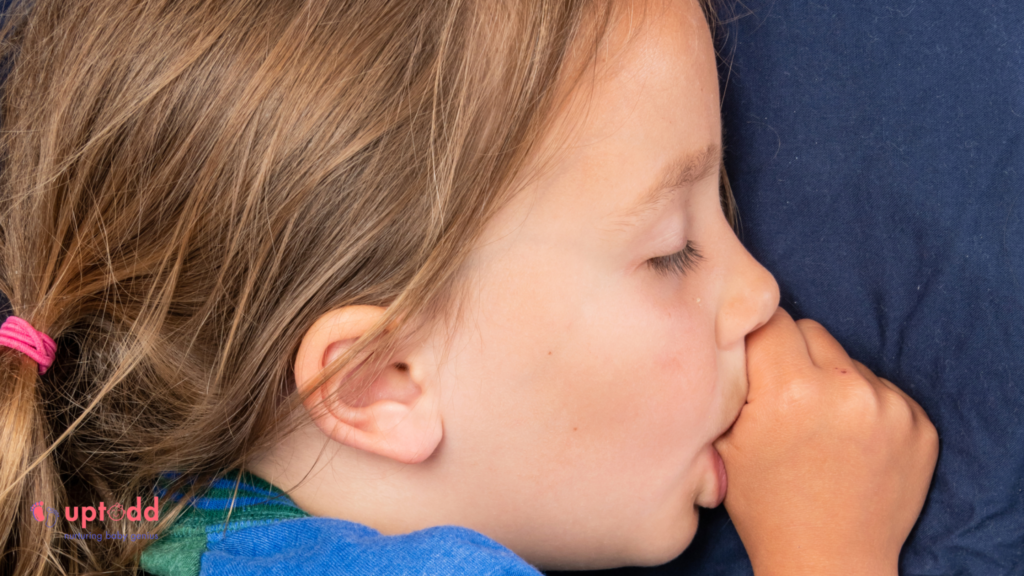
Thumb sucking- Let us break the habit
Topic
Thumb sucking- Let us break the habit
May start as early as
In the womb or shortly after birth
─────────
May end around
By age 5
If you are here you must be thinking, is thumbsucking normal for your kid? Babies have a natural urge to suck onto things. This urge usually decreases after the age of 12 months. But many babies continue to suck their thumbs to soothe themselves and engage in thumb sucking. It can become a habit in babies to comfort themselves when they feel hungry, afraid, restless, quiet, sleepy, or bored. So let us today see if it is normal or not, and how you can help your baby.
In this blog we will read about-
- Why do toddler’s suck their thumb?
- Till what age is thumb sucking normal?
- How can you change thumb sucking behaviour?
- Are there any side effects of thumb sucking?
Why do babies and toddlers suck their thumbs?

Babies have natural behaviour and sucking reflexes, which can cause them to put their thumbs or fingers into their mouths — sometimes even before birth means learning from the womb itself. Because it makes babies feel secure, some babies might eventually develop a habit of it when they’re in need of soothing or going to sleep.
Now let us see what the Great Psychologist Sigmund Freud has on it-
During this stage, babies are fixated on their mouths, and they derive pleasure from things like sucking their thumbs or using a pacifier or bottle. Freud believed that the oral stage is directly related to the infant’s first 18 months of life Freud believed that conflicts during the oral stage can lead to oral fixation, which can cause problems later in life. For example, if an infant is weaned too early or late, they might not adjust to new eating habits. Other reasons for oral fixation include neglect or overprotection. That is why it is important to let your little ones explore the world through their mouths orally and not to be too worried about it.
Reference- Freud’s Theory
How long does thumb sucking usually last?

Many babies stop sucking their thumbs on their own between ages 2 and 4.
But even a baby who’s stopped sucking his or her thumb might go back to the behaviour during times of stress.
Is thumb sucking bad for teeth?
Many baby who suck their thumb do not have problems with their teeth. Whether it causes problems may depend on:
- Your baby’s growth and development
- How often they suck their thumb
- The angle of their thumb in their mouth
- How hard they suck
It isn’t usually a concern until a baby’s permanent teeth come in. Possible problems caused by this habit can include:
- Your baby’s upper jaw being pushed out further from their face
- Upper front teeth being pushed upwards and out, commonly called an overbite’
- Tipped back lower front teeth
- A gap between your baby’s upper and lower teeth
- Not being able to bite the front teeth together
- The palate (roof of the mouth) becoming pushed up and narrow
Reference- NCBI
Now comes the questions when should you intervene so let us read the same-
When should you intervene-
Thumb sucking is usually not an issue until a baby’s permanent teeth emerge. At this time, thumb sucking may begin to impact the roof of the mouth (palate) or how the teeth align. The frequency, duration, and intensity with which your kid sucks on his or her thumb affects the chance of dental problems developing.
Although some experts recommend treating sucking behaviors before the age of three, the American Academy of Pediatrics advises limiting treatment to babies who continue thumb-sucking after the age of five.
Reference- Mayo Clinic
What can I do to encourage my baby to stop thumb sucking?
Talk to your baby about this habit. You’re more likely to be successful in stopping the habit if your baby wants to stop and helps choose the method involved.
Sometimes paying no attention to this habit is enough to stop the behaviour — especially if your baby uses it to get attention. If ignoring it isn’t effective, try one of these techniques:
Use positive reinforcement
- Praise your baby or provide small rewards — such as an extra bedtime story or a trip to the park — when he or she isn’t thumb sucking. Set attainable goals, such as no thumb sucking an hour before bed. Place stickers on a calendar to record the days when your baby successfully avoids doing it.
- Praise your baby when they’re not sucking their thumb. Offer small rewards or words of encouragement to motivate them to stop.
Redirect Attention
- When you notice your baby sucking their thumb, gently redirect their attention to a toy, book, or activity to engage their hands and mind elsewhere. DON’T try a glove or a mitten on the hand as a quick-fix to thumb or finger sucking. “This will just frustrate them and cause more anxiety.”
Identify triggers
- If your baby sucks his or her thumb in response to stress, identify the real issue and provide comfort in other ways — such as with a hug or reassuring words. You might also give your baby a pillow or stuffed animal to squeeze.
- Avoid scolding or punishing your baby, as this can create anxiety and worsen the habit.
- Provide alternative soothing methods such as a pacifier or comfort blanket. Be cautious not to replace it with another potentially problematic habit.
By the end of this blog it is safe to say that thumb sucking till the age of 2-5 years can be a way for babies to express themselves and explore things orally. It also becomes a soothing mechanism. But any thumb sucking behaviour post that age can cause significant developmental issues that are not just limited to physical or oral aspects but can extend to their cognitive growth too. If your baby is indulged in the thumb sucking behaviour after 5 years of age it is always best to identify triggers and help them correct the wrong behaviour patterns developed in the form of thumb sucking.






